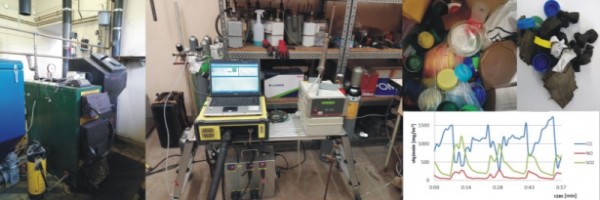Low-stack emissions, i.e. emissions from sources lower than 40 metres, are an important source of air pollution. These include emissions from local coal-fired boilers and domestic heating stoves. Air pollutants from small, dispersed, stationary sources are mainly from solid fuel combustion.
Approximately 35% of households in Poland use solid fuel boilers (normal or combined). The use of a fuel supply in solid fuel boilers with permanent combustion grates improves the combustion conditions for solid fuels. However, the design of a boiler with a fuel feeder also enables the combustion of solid waste, such as shredded waste mixed with coal in the form of pea coal, which is fed directly into the combustion chamber via the fuel feeder. The incineration of municipal solid waste in unadapted boilers leads to the discharge of additional pollutants into the atmosphere.
The main objective of the project was to find trace elements, mainly organic compounds characteristic of a certain group of MSW, in the fly ash produced by the co-incineration of certain solid waste fractions (EPDM rubber, tyres, waste paper, PVC, PE) in an 18 kW boiler with automatic fuel feed.
Research material - fly ash collected during the eight-hour combustion cycles of a certain mixture of municipal waste with hard coal. The qualitative and quantitative composition of the main gaseous pollutants (NOx, CO, S02, VOC) was continuously analysed. The dust concentration in the flue gas was determined by the gravimetric method. The fugitive dust samples were subjected to thermo-optical analysis of the content of OC and EC and granulometric analysis of the content of PM 10 and PM2_ 5.
For the determination of organic compounds, including PAHs, gas chromatography was used in conjunction with a mass detector (GC/MS). For the identification of substances originating from unblown solid waste particles, a portion of the fly ash that could not be analysed by conventional gas chromatography was analysed by Py-GC/MS.
When all wastes were co-combusted with coal, higher concentrations of carbon monoxide were found than when coal itself was burnt, indicating deterioration of combustion conditions and incomplete combustion.
The high EC carbon content (soot) and the high PM10 and PM2_5 content in the fly ash samples, the calculated emission factors for the most important gaseous and particulate pollutants, the higher PAH content and the higher proportion of PAHs with five or more members in the fly ash from the co-incineration of coal with municipal waste than from the combustion of hard coal alone demonstrate the high harmfulness of such combustion for society and the environment.
Thanks to the possibility of comparing the organic compounds in the fly ash from the combustion of hard coal alone and the co-incineration of coal with certain solid fractions of municipal waste incinerated under the same conditions, it was possible to identify individual organic species and groups of compounds and assign diagnostic indices specific to a given solid waste.
The main markers for waste incineration are: Waste paper - levoglucosan resulting from the decomposition of cellulose, PVC - chlorinated phenols, PE - high ratio of phenanthrene to anthracene and dominance of straight carbon N-alkanes, tyres - high content of heavier PAHs and methyl derivatives of quinoline.
By conducting research on a real boiler used in central heating systems in small buildings, rather than on a physical or mathematical model, the results obtained allow for an ecological assessment of the impact of co-incineration of municipal waste and hard coal and help to identify traces of combustion of a specific fraction of MSW in the particulate matter.




